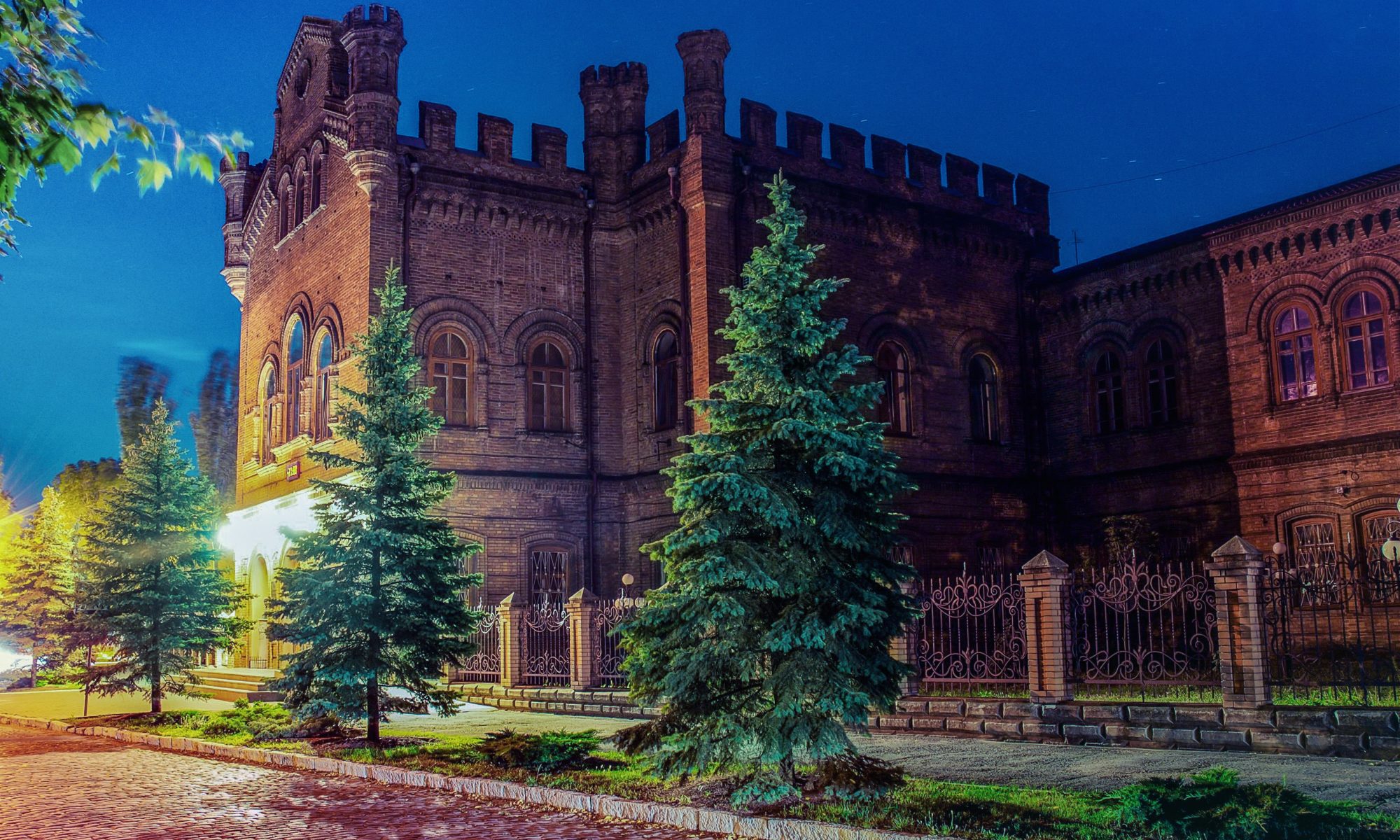19 листопада студентський науковий гурток «Соціалізація дітей і молоді в умовах сучасного соціокультурного простору» (керівниця – доцентка Наталя Захарова) урочисто відкрив новий сезон зустрічей зі здобувачами вищої освіти освітньо-професійних програм кафедри соціальної роботи та інклюзивної освіти.
Теплими словами привітали «новачків» – студентів перших курсів бакалаврського й магістерського рівнів, денної та заочної форм навчання, які роблять свої перші кроки у науковій діяльності. Адже наука – це не лише інструмент пізнання світу, а й потужний чинник соціалізації особистості, формування професійної культури та розвитку критичного мислення.
Провідні цілі засідання гуртка включали:
- формування позитивної мотивації до науково-дослідної діяльності;
- демонстрацію можливостей професійного зростання через освіту, науку та самоосвіту;
- створення неформального простору для обміну ідеями між викладачами-науковцями та здобувачами.
У вступному слові модераторка наголосила: сучасні вимоги до підготовки соціальних педагогів і соціальних працівників зростають, а студентська наукова діяльність стає ключовим інструментом інтеграції навчання, науки і практики. Вона сприяє розвитку аналітичного мислення, креативності, дослідницьких умінь – тих компетентностей, що формують справжнього фахівця.
Здобувачів першого року участі у гуртку ознайомили з його цілями, завданнями, історією та основними досягненнями. Особливий акцент було зроблено на періоді відновлення діяльності гуртка в умовах «університету без стін» та системному поглибленні тематики соціалізації в різних її проєкціях.
Основні напрями досліджень останніх років:
- 2022–2023 н.р. – «Соціальний простір без “павуків”»: профілактика асоціальних молодіжних рухів;
- 2023–2024 н.р. – «Зелена соціальна робота в контексті соціалізації особистості»: взаємодія триади «особистість – суспільство – природа»;
- 2025–2026 н.р. – «Соціалізація особистості в умовах соціальної невизначеності»: формування стресостійкості молодого покоління до сучасних кризових викликів.
Гурток – це не просто навчальна активність, а живий простір для дискусій, пошуку рішень, творчих ідей та професійного зростання.
Справжньою «родзинкою» розширеного засідання стала презентація нової рубрики «Давайте знайомитися: викладач – науковець» під девізом «Наука поруч: історії успіху наших викладачів».
Першою героїнею стала докторка педагогічних наук, професорка кафедри соціальної роботи та інклюзивної освіти, перша проректорка БДПУ Ольга Іванівна Гуренко. Вона поділилася історією свого становлення як викладачки й дослідниці, поглядами на сучасні соціальні й педагогічні виклики, роллю мультикультурності в житті суспільства, досвідом наукового пошуку відповідей на складні суспільні питання.
Її життєвий і професійний шлях – переконливий доказ того, що можна досягти будь-якої мети, якщо маєш внутрішній імпульс: прагнення розуміти, творити, долати, змінювати світ на краще. Ольга Іванівна наголосила на важливості відкритості, працьовитості, збереженні сімейних цінностей та постійного особистісного вдосконалення.
Висловлюємо щиру подяку Ользі Іванівні за натхненну зустріч і підтримку студентської наукової спільноти; тепле, проникливе науковістю й гармонією спілкування зі здобувачами та колегами.
Ідея популяризації науки через живі історії викладачів кафедри емоційно відгукнулася студентам, дозволивши по-новому подивитися на викладача-науковця та побачити реальні можливості власного професійного розвитку.
Сподіваємося продовжити рубрику знайомства з викладачами кафедри як науковцями та рушіями освітніх змін.
Проведений захід відіграє важливу роль у залученні здобувачів до наукової діяльності, активізує дослідження актуальних соціально-педагогічних питань, розширює підходи до соціалізації та професійного становлення майбутніх фахівців у контексті сучасних викликів.
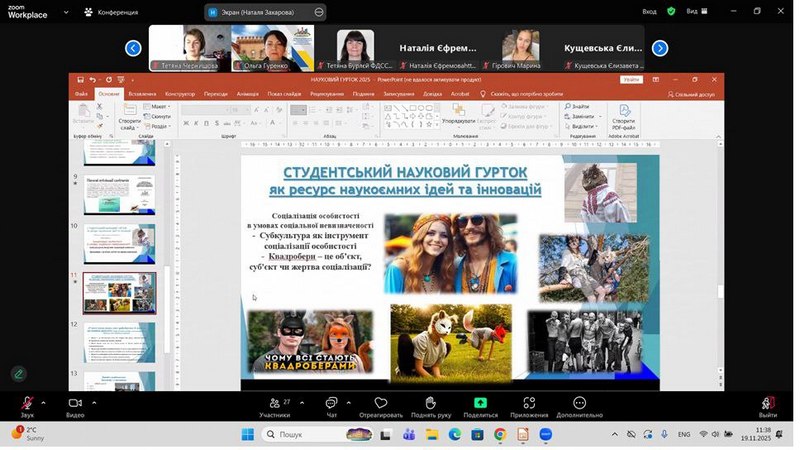
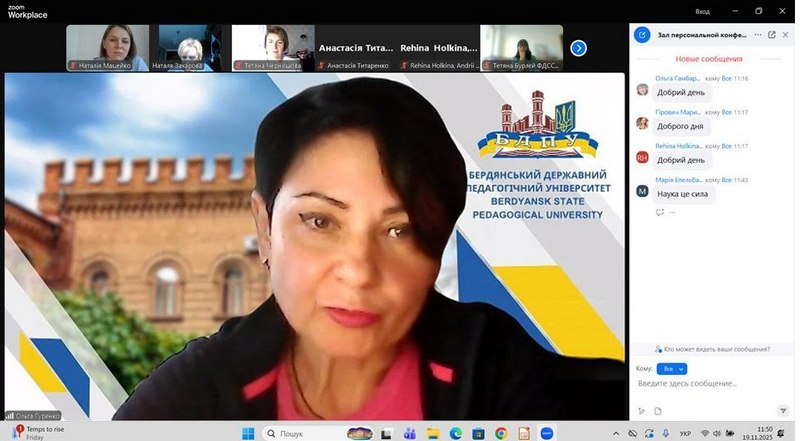
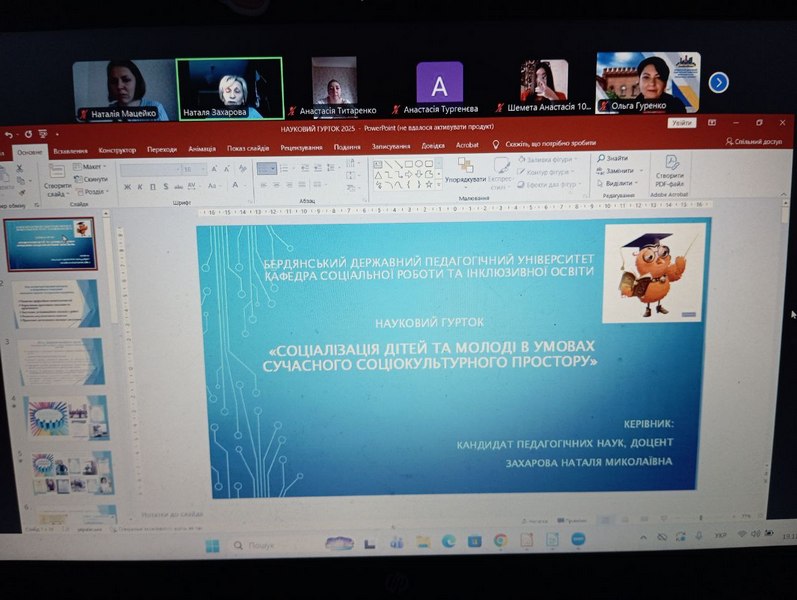
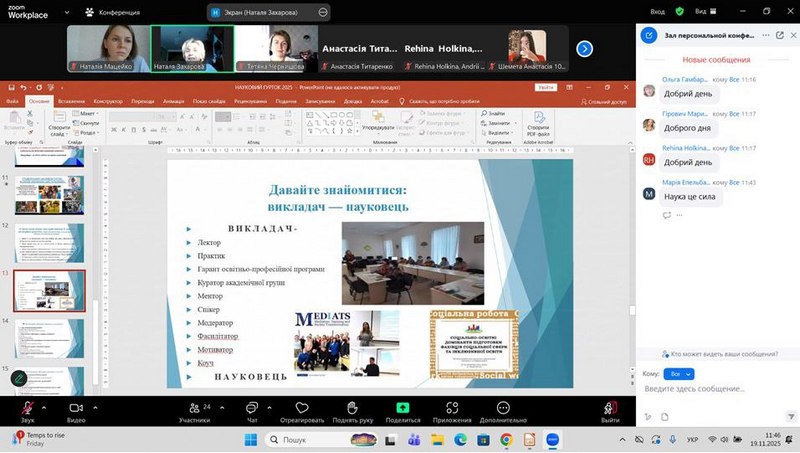
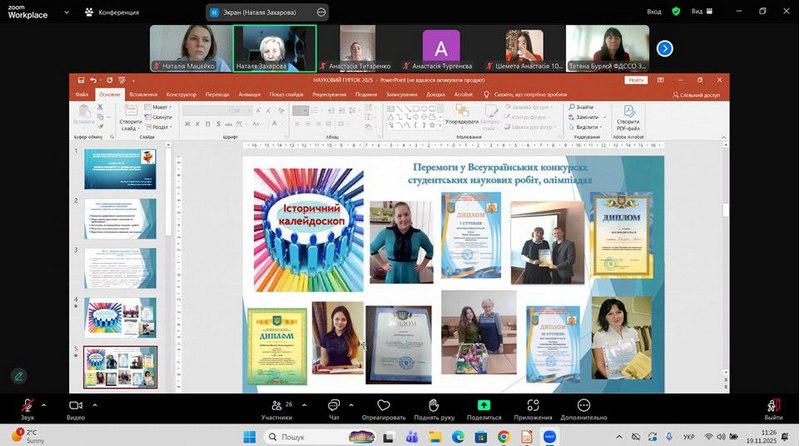

За матеріалами кафедри соціальної роботи та інклюзивної освіти
Student Research Start:Opening of the New Season of the “Socialization of Children and Youth” Academic Club
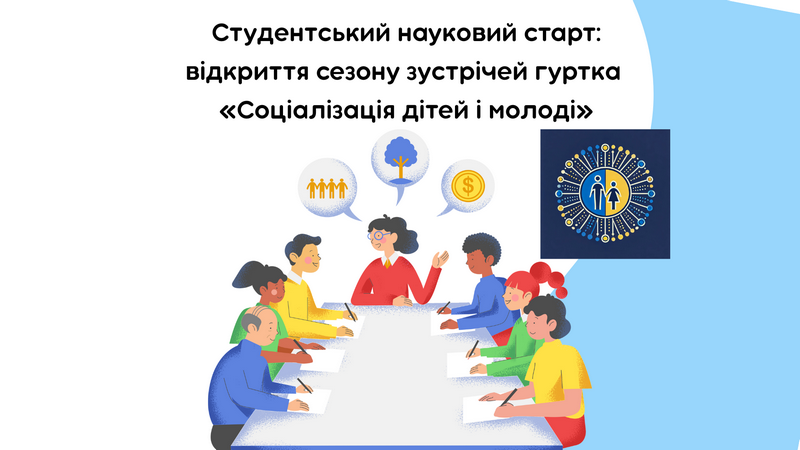
On November 19, the student research club “Socialization of Children and Youth in the Context of the Modern Sociocultural Space” (supervised by Associate Professor Nataliia Zakharova) officially opened a new season of meetings with students of the educational programs offered by the Department of Social Work and Inclusive Education.
Warm greetings were extended to the “newcomers” – first-year bachelor’s and master’s students, both full-time and part-time, who are taking their first steps in research. After all, science is not only a tool for understanding the world but also a powerful factor in personal socialization, professional culture formation, and the development of critical thinking.
The key goals of the meeting included:
- fostering positive motivation for research activities;
- demonstrating opportunities for professional growth through education, science, and self-education;
- creating an informal space for sharing ideas between academic staff and students.
In her opening remarks, the moderator emphasized that today’s requirements for preparing social pedagogues and social workers are increasing, and student research is becoming a key tool for integrating education, science, and practice. It enhances analytical thinking, creativity, and research skills – competencies essential for a real professional.
First-year participants were introduced to the aims, tasks, history, and major achievements of the club. Special attention was paid to the period of its revival in the conditions of a “university without walls” and to the systematic deepening of the topic of socialization in its various dimensions.
Key research directions in recent years:
- 2022–2023: “A Social Space Without ‘Webs’” – prevention of antisocial youth movements;
- 2023–2024: “Green Social Work in the Context of Personality Socialization” – interaction within the triad person–society–nature;
- 2025–2026: “Socialization of the Individual in Conditions of Social Uncertainty” – developing youth resilience to modern crisis challenges.
The club is more than an academic activity – it is a vibrant space for discussion, problem-solving, creative ideas, and professional growth.
A true highlight of the meeting was the presentation of a new section:
“Let’s Get Acquainted: Lecturer as Researcher”
under the motto “Science Nearby: Success Stories of Our Lecturers.”
The first guest was Dr. Olha Hurenko, Doctor of Pedagogical Sciences, Professor of the Department of Social Work and Inclusive Education, and First Vice-Rector for Academic Affairs at BSPU. She shared her story of becoming a lecturer and researcher, her views on modern social and pedagogical challenges, the role of multiculturalism in society, and her experience in searching for scholarly answers to complex social questions.
Her personal and professional journey stands as a convincing example that any goal can be achieved when one has an inner drive – the desire to understand, create, overcome obstacles, and make the world better. She emphasized the importance of openness, hard work, family values, and continuous self-development.
We extend our sincere gratitude to Olha Ivanivna for this inspiring meeting, for supporting the student research community, and for her warm, meaningful dialogue with students and colleagues. The idea of popularizing science through the personal stories of lecturers resonated deeply with students, helping them see the “lecturer-researcher” from a new angle and recognize their own opportunities for professional development.
We look forward to continuing this series of meetings to introduce other lecturers of the department as scholars and drivers of educational change.
The event plays an important role in engaging students in research, activating studies of current socio-pedagogical issues, and expanding approaches to socialization and professional development in the context of today’s challenges.






Based on materials by
the Department of Social Work and Inclusive Education
